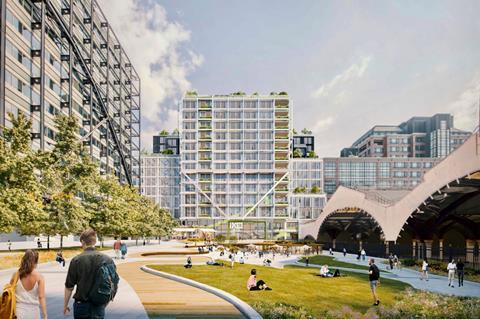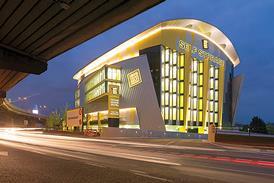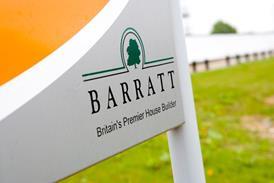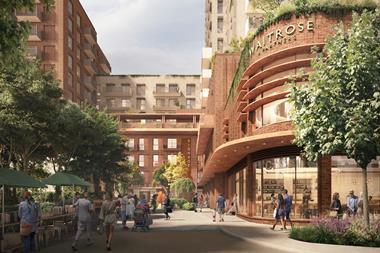A tip for smaller landlords facing the forbidding prospect of spending £200/sq ft rejuvenating elderly office blocks in order to merit mandatory Energy Performance Rating ‘B’ by 2030.

Plough through the planning registers before spending money on consultants to tell you how to spend your money. Amazing what you can glean from the hundreds of pages of bumf supplied in support of a Premier League application.
One fine example: the 152 sets of documentation supporting an application to rebuild 1 Exchange Square at Broadgate are a treasure-saving trove. The 13-floor block was built in 1988. The European Bank for Reconstruction and Development is vacating after 30 years in favour of Canary Wharf. The plans were lodged last October by LaSalle, on behalf of Malaysian state fund Permodalan Nasional Berhad, which paid £395m for the clunker in 2012.
The challenge faced by development manager M3, architect Fletcher Priest and ubiquitous-in-the-City planning consultant DP9 are simply scaled-up versions of issues faced by those rebooting smaller gas-guzzlers. Pore over the design and access statements; inspect the plans. These guys know stuff. They sit at the front edge of a huge wave of activity. In the City alone, 10% of offices will become noncompliant; the figure is one million nationwide.
Plough through the planning registers before spending money on consultants
Countless articles giving general advice have been published. Don’t blithely jump from them to paying consultants to tell you what you can find out for yourself. Mug up on the devilish detail provided for free by experts via a planning system that happily insists on disclosure. Your homework doesn’t necessarily need to be just Exchange Square. Somewhere, someone will have applied to upgrade a building close enough in size, shape or type to yours.
Someone, somewhere, is no doubt already using Adobe Acrobat to filch and subtly alter text. The planning rules have turned once-proprietorial information into a free library. Disclosure of viability studies can even reveal financial modelling and the way others manage Section 106 wrangles. Fortunately, brains cannot be read, and reputations cannot be cut and pasted. But good ideas are there for the taking.

Upgraders will find a plethora of pinchable ideas in the Exchange Square submission. The net lettable area has been pushed up to 463,000 sq ft from 386,000 sq ft without increasing height – not allowed. Look how they did that. Keeping the steel frame and reducing energy consumption by 35% will get site emissions down by 62.2%. Buying carbon credits on top allows them to boast ‘net zero’.
This transition is not easy. A waking nightmare faces owners of second-tier stock. The spectre of WFH lingers at this green feast of change. A babble of planet-saving voices round the table talk up their own virtuous book. Think: will anyone really want your improved space? Consider other options, such as change of use. Still feel upgrading is the best bet? You can learn a lot – not everything – from those with money already on the table.
Debating space
Take pity on Greater London Authority (GLA) staff suffering under the fiat of callous mayor Sadiq Khan. The troops are currently being force-marched eastwards from the ‘Glass Testicle’ by Tower Bridge into the GLA-owned ‘Crystal’, a defunct Siemens ‘brand palace’ that sits on the wrong side of the Thames at the foot of another GLA folly, Boris Johnson’s mostly empty cable cars. A generation ago, the GLA resided in palatial County Hall, opposite the Palace of Westminster. Such has been the reduction in the power of local government.
Moving callously on, what on earth will Kuwaiti-owned St Martins Property do with its purpose-built City Hall, opened just 20 years ago? St Martins tends to be Bambi-shy of the media. So, best not ask boss Richard Ratcliffe what it intends to do with the £40m bauble. They must be scratching their heads. A concert hall? Too many already. A theatre? The South Bank is also packed with theatres. Offices? Quite enough glassy blocks nearby. Got it! Debating space during the restoration of the Palace of Westminster.
Peter Bill is a journalist and the author of Planet Property and Broken Homes






























No comments yet